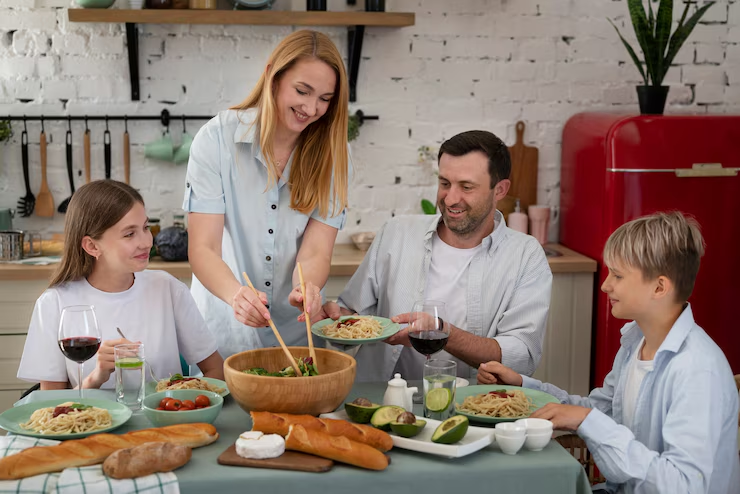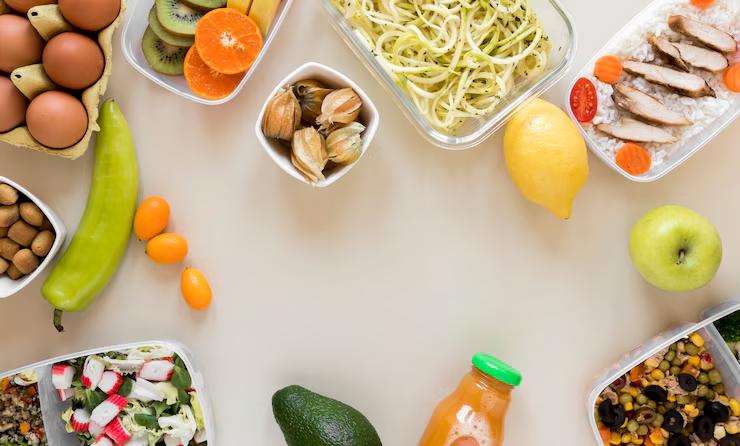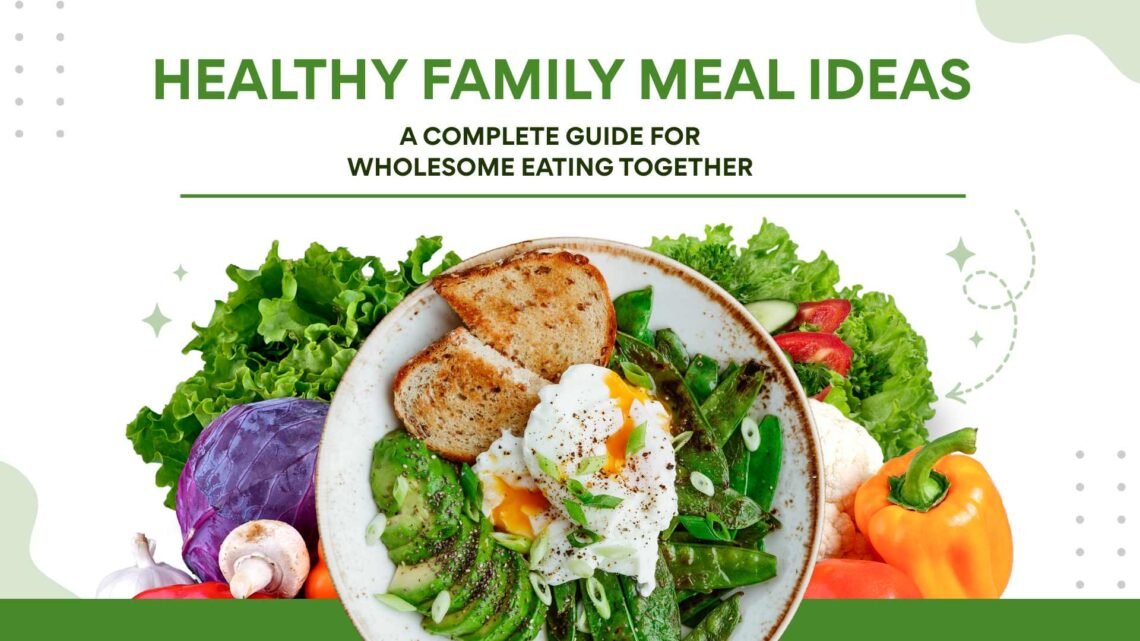In today’s fast-paced world, balancing health, taste, and convenience can be a challenge—especially when feeding an entire family. But here’s the good news: preparing healthy family meals doesn’t have to be complicated or time-consuming. With a little planning and the right approach, you can create delicious, balanced meals that everyone in your household will enjoy.
This comprehensive guide explores everything you need to know about healthy family meal ideas, making it easier to nourish your loved ones with balanced, delicious meals every day. From understanding why healthy meals are essential for long-term wellness to learning how to plan and prepare them, this article covers it all. You’ll discover top 8 expert tips to simplify mealtime, encourage nutritious eating habits, and save time in the kitchen.
Whether you’re looking for wholesome breakfast options, easy-to-pack lunches, satisfying dinners, or guilt-free snacks, there’s something for every taste and age group. These healthy family meal ideas are designed to be practical, affordable, and enjoyable—bringing families together around the table. With smart planning, colorful ingredients, and a touch of creativity, you can create meals that support physical health, emotional connection, and lifelong habits of healthy eating. Start your journey toward better family nutrition today with these easy, effective strategies..
🍽️ Why Healthy Family Meals Matter

Healthy family meal ideas go beyond simply providing nourishment—they play a crucial role in building a foundation for long-term health, positive daily habits, and stronger family relationships. When families come together to enjoy wholesome, balanced meals, it creates more than just full stomachs; it fosters communication, emotional connection, and consistency in routines. Children who grow up with regular healthy meals are more likely to develop smart eating habits that stay with them for life, reducing the risk of obesity, diabetes, and other chronic conditions.
Mealtimes also offer an opportunity to unplug from screens, share daily experiences, and build a sense of security and belonging. By implementing thoughtful healthy family meal ideas, parents can model good choices, teach nutritional awareness, and create a lasting impact on their children’s physical and mental well-being. Ultimately, healthy meals at home become the heart of a thriving, connected family lifestyle rooted in wellness and love.
1. Builds Lifelong Habits
Children who are raised on healthy family meal ideas—with balanced, homemade meals—tend to carry those positive habits well into adulthood. These early experiences with nutritious eating help shape their food preferences, lifestyle choices, and long-term health. When kids regularly consume meals made with whole foods, lean proteins, vegetables, fruits, and whole grains, they’re less likely to develop unhealthy eating patterns later in life. This significantly lowers their risk of chronic diseases such as obesity, type 2 diabetes, and heart-related conditions.
Introducing a variety of nutritious foods early on also expands their palate and reduces picky eating. Plus, children learn valuable lessons about portion control, mindful eating, and food preparation. By consistently offering healthy family meal ideas at home, parents not only nourish their children physically but also empower them with the knowledge and habits to maintain a healthy, balanced lifestyle that supports lifelong wellness and disease prevention..
2. Encourages Better Communication
Sitting down together to enjoy meals created from thoughtful healthy family meal ideas offers more than just physical nourishment—it strengthens emotional bonds and promotes meaningful connection. Family mealtime becomes a valuable opportunity to engage in open conversation, share daily experiences, and build trust among family members. In a world where screens and busy schedules often dominate, gathering around the table encourages everyone to unplug from devices and be present with one another. These shared moments help foster a sense of belonging, emotional security, and mutual understanding, especially important for growing children.
Consistent family meals also create comforting routines that promote stability and reduce stress. When families prepare and eat healthy meals together, they not only support physical wellness but also create a positive emotional environment. Integrating healthy family meal ideas into your routine turns everyday meals into meaningful rituals that bring loved ones closer while reinforcing the importance of togetherness and balanced nutrition.
3. Supports Mental Health

Incorporating healthy family meal ideas into daily life does more than improve physical health—it significantly enhances emotional and mental well-being. Research shows that families who regularly eat nutritious meals together experience lower stress levels, and children in these households tend to have reduced rates of depression and anxiety. Sharing healthy meals as a family fosters a sense of security, routine, and emotional connection that helps children feel supported and valued.
These mealtimes provide a safe space to talk, listen, and build resilience, which contributes to stronger self-esteem and better coping skills. The consistency of eating together, especially with wholesome foods, reinforces feelings of comfort and stability. As children develop both physically and emotionally, the simple act of coming together around balanced meals can have lasting positive effects. By making healthy family meal ideas a central part of your routine, you nurture not only your family’s bodies but also their emotional and mental health.
4. Improves Academic and Behavioral Outcomes
Children who regularly enjoy home-cooked meals based on healthy family meal ideas often experience noticeable benefits in both academic performance and behavior. Nutritious, balanced meals fuel the brain, enhancing concentration, memory, and overall cognitive function—key components for success in school. When children are well-nourished with wholesome foods like fruits, vegetables, whole grains, and lean proteins, they’re better equipped to stay focused, retain information, and actively participate in learning.
In addition to academic advantages, eating together as a family helps create structure and emotional stability, which can lead to fewer behavioral issues. These shared mealtimes also encourage open communication, allowing parents to stay connected with their children’s emotional needs and daily experiences. Consistently preparing and enjoying healthy family meal ideas not only supports physical growth but also nurtures emotional development, discipline, and positive social behavior, setting children up for success both in school and in life.
🧠 Top 8 Tips for Planning Healthy Family Meals
Let’s make healthy eating easy and sustainable with these proven strategies:
1. Plan Your Meals Weekly
Planning ahead is a key strategy for successfully incorporating healthy family meal ideas into your routine. When you take the time to create a weekly meal calendar, it simplifies your daily decisions, reduces mealtime stress, and helps you avoid those last-minute unhealthy food choices. By mapping out breakfast, lunch, and dinner in advance, you can ensure a balanced variety of meals, use ingredients more efficiently, and make smarter grocery shopping decisions. This not only cuts down on unnecessary spending but also reduces food waste.
With a plan in place, you’ll be less tempted to rely on takeout or processed options, and more likely to prepare wholesome, home-cooked meals. Including the family in the planning process can also make mealtime more fun and engaging. Thoughtfully preparing healthy family meal ideas ahead of time helps create structure, saves time during busy weekdays, and supports your family’s long-term physical and emotional well-being
2. Involve the Whole Family

Involving children in the kitchen is a powerful way to make healthy family meal ideas more appealing and successful. When kids help choose recipes or participate in preparing meals, they feel a sense of ownership and pride in what they’ve created. As a result, they’re far more likely to try and enjoy the nutritious foods they helped cook. This hands-on experience not only reduces picky eating but also builds lasting, healthy eating habits.
Beyond improving mealtime cooperation, involving kids teaches essential life skills such as measuring, chopping, and understanding food groups and nutrition. It becomes an opportunity for learning, bonding, and fun. Whether it’s washing vegetables, stirring a pot, or assembling wraps, even simple tasks make children feel included. Making healthy family meal ideas a shared activity turns cooking into quality family time and lays the foundation for confident, health-conscious eaters who grow up with a positive relationship with food.
3. Keep It Simple
Embracing healthy family meal ideas doesn’t have to be complicated or time-consuming. In fact, some of the most nutritious and delicious meals are also the simplest to prepare. By focusing on whole, fresh ingredients—such as vegetables, lean proteins, whole grains, and healthy fats—you can create satisfying dishes that support your family’s well-being without spending hours in the kitchen. Look for recipes that use just 5–7 ingredients and can be made in under 30 minutes. Quick stir-fries, sheet-pan dinners, grain bowls, and fresh salads are great examples of fast, wholesome meals that the whole family will enjoy.
Simplifying your cooking routine not only reduces stress but also encourages consistency, making it easier to stick to healthy habits. With a little creativity and smart planning, healthy family meal ideas can be both manageable and flavorful, proving that nourishing your loved ones doesn’t require complicated steps—just good ingredients and thoughtful choices.
4. Prep Ingredients in Advance
One of the best ways to stick to your healthy family meal ideas is to prep ingredients ahead of time. Washing, chopping, and portioning vegetables in advance makes cooking quicker and less stressful during busy weekdays. You can also marinate proteins ahead of time to enhance flavor and save valuable minutes at dinner. Cooking staples like brown rice, quinoa, or whole wheat pasta in bulk ensures you always have the base for a nutritious meal ready to go.
This kind of meal prep streamlines your routine and makes it easier to follow through with healthy choices, even on hectic days. Having prepped ingredients on hand allows you to assemble balanced meals faster and reduces the temptation to grab takeout or processed foods. By investing a bit of time each week in preparation, your healthy family meal ideas become more practical, efficient, and enjoyable for everyone in the household.
5. Focus on Balance
Each meal should include:
- Protein (chicken, beans, tofu)
- Healthy fats (olive oil, avocado)
- Complex carbs (quinoa, brown rice)
- Fiber-rich veggies and fruits
6. Make Healthy Swaps

Replace processed or fried items with healthier versions. For example:
- White rice → Brown rice or quinoa
- Sour cream → Greek yogurt
- Sugary cereal → Oats with fruits and nuts
7. Use Color as a Cue
Creating bright, colorful meals is a fun and effective way to make your healthy family meal ideas both visually appealing and highly nutritious. Vibrant colors on your plate often indicate a wide range of vitamins, minerals, and antioxidants that support overall health. By including a rainbow of vegetables and fruits—such as red bell peppers, orange carrots, yellow corn, green spinach, blueberries, and purple cabbage—you ensure a variety of nutrients that boost immunity, improve digestion, and promote energy.
Colorful meals are especially helpful in encouraging kids to try new foods, making healthy eating more exciting and less of a chore. Plus, diverse colors enhance the taste and texture of your dishes, adding more flavor without relying on heavy sauces or salt. Whether it’s a colorful stir-fry, salad bowl, or fruit platter, integrating this rainbow rule into your healthy family meal ideas turns every meal into a nutrient-rich celebration that supports well-being for all ages.
8. Batch Cook and Freeze
One smart way to stick to your healthy family meal ideas is to cook in bulk and freeze extra portions for future use. Preparing larger batches of soups, stews, casseroles, or even whole-grain pasta dishes allows you to save time and effort on busy days when cooking from scratch isn’t possible. By freezing these meals in individual or family-sized portions, you always have a healthy, homemade option ready to heat and serve—helping you avoid last-minute takeout or unhealthy packaged foods.
This approach not only saves money but also reduces food waste and ensures your family continues to enjoy balanced, nutritious meals even on hectic nights. Batch cooking is perfect for families juggling school, work, and activities. It’s a practical way to keep your healthy family meal ideas consistent throughout the week while making meal prep more efficient. With a well-stocked freezer, healthy eating becomes easier, faster, and more sustainable.
🍳 Healthy Breakfast Ideas for the Whole Family
Breakfast plays a vital role in establishing energy, focus, and mood for the day ahead, making it an essential part of your healthy family meal ideas. Instead of starting the morning with sugar-laden cereals that offer little nutritional value, opt for wholesome alternatives that fuel the body and brain. Try options like oatmeal topped with fresh fruits and nuts, whole-grain toast with avocado, or protein-packed smoothies blended with spinach, banana, and Greek yogurt. These choices provide fiber, healthy fats, and protein to keep everyone feeling full and energized until the next meal.
Preparing simple yet nutritious breakfasts helps develop long-term healthy eating habits, especially in children. Involving your family in breakfast prep can also make mornings more enjoyable and less rushed. With thoughtful planning and a few quick recipes, breakfast becomes more than just a meal—it becomes a daily opportunity to reinforce your healthy family meal ideas and set everyone up for success.:
1. Veggie-Packed Egg Muffins
- Ingredients: Eggs, spinach, bell peppers, mushrooms, cheese
- Make in muffin tins and store in the fridge for the week.
2. Oats & Fruit Parfaits

- Layer oats, Greek yogurt, berries, and a sprinkle of nuts in a jar.
- Let sit overnight for a ready-to-eat breakfast.
3. Smoothie Bowls
- Blend banana, spinach, and frozen berries with almond milk.
- Top with granola, seeds, and fresh fruits.
4. Whole-Grain Pancakes with Fruit
- Use whole wheat flour and serve with sliced banana or strawberries.
- Drizzle with honey or maple syrup instead of refined sugar.
🥪 Healthy Lunchbox Ideas for Kids and Adults
Say goodbye to boring sandwiches! These lunch ideas are fun, balanced, and easy to pack:
1. Turkey & Avocado Wraps
- Whole-grain tortilla, turkey breast, avocado, spinach, and hummus.
2. Quinoa Salad Jars
- Layers of quinoa, cherry tomatoes, cucumber, chickpeas, feta, and olive oil.
3. Mini Veggie Frittatas
- Eggs mixed with leftover veggies and baked in muffin tins.
4. Bento Boxes
- Mix and match: Boiled eggs, cheese cubes, fruit slices, roasted nuts, crackers, and veggies with dip.
🍲 Healthy Family Dinner Ideas
Dinner is a great time to bond and unwind. Here are nutritious and satisfying dinner options:
1. Grilled Chicken & Veggie Skewers
- Marinate chicken in herbs and lemon, grill with peppers, onions, and zucchini.
2. Stir-Fried Tofu with Brown Rice
- Tofu, broccoli, carrots, and snap peas with low-sodium soy sauce.
3. Salmon with Sweet Potato Mash
- Bake salmon with garlic and lemon; serve with mashed sweet potatoes and green beans.
4. One-Pot Lentil Soup
- Lentils, tomatoes, carrots, celery, and herbs simmered into a comforting bowl.
5. Vegetable Pasta Bake
- Whole wheat pasta, marinara, mushrooms, spinach, and mozzarella baked to perfection.
🥗 Healthy Sides and Snacks for the Whole Family
Sides:
- Steamed broccoli with lemon
- Roasted carrots and chickpeas
- Baked sweet potato fries
- Mixed greens salad with vinaigrette
Snacks:
- Apple slices with peanut butter
- Homemade trail mix (nuts, seeds, raisins)
- Carrot sticks with hummus
- Cottage cheese with pineapple
🧃 Healthy Drinks for Kids and Adults
Avoid sugary sodas or juices. Opt for:
- Infused water with mint and berries
- Homemade smoothies
- Herbal iced teas
- Coconut water (occasionally)
- Fresh lemonade with honey
🛒 Healthy Grocery List Essentials
Keeping a well-stocked pantry and fridge ensures you’re always ready to prepare healthy meals. Here’s what to stock:
Proteins:
- Eggs
- Chicken breast
- Lentils and beans
- Tofu/Tempeh
- Fish (salmon, tuna)
Grains:
- Quinoa
- Brown rice
- Whole-grain pasta
- Rolled oats
- Whole wheat bread
Fruits & Veggies:
- Apples, bananas, oranges
- Leafy greens (spinach, kale)
- Bell peppers, carrots, broccoli
- Avocados
- Tomatoes
Dairy or Alternatives:
- Low-fat yogurt
- Milk or plant-based milk
- Cheese
Pantry Staples:
- Olive oil, coconut oil
- Herbs & spices
- Nuts and seeds
- Nut butter
- Canned beans and tomatoes
🧠 Teaching Kids Healthy Eating Habits
Creating healthy family meals is also about instilling good values and knowledge. Here are some simple ways to teach children:
1. Lead by Example
Children mirror adults. If you eat veggies, they’ll be more likely to try them too.
2. Educate Through Fun
Make food fun—talk about how carrots help your eyes or how milk strengthens bones.
3. Avoid Food as Reward or Punishment
Let food be about nourishment, not behavior control.
4. Make Mealtime Enjoyable
Avoid stress or scolding during meals. Create a warm, relaxed environment.
👨👩👧👦 Sample Weekly Healthy Family Meal Plan
Here’s a sample meal plan to help you get started:
| Day | Breakfast | Lunch | Dinner |
| Monday | Overnight oats with fruits | Quinoa bowl with chickpeas | Grilled chicken with roasted veggies |
| Tuesday | Smoothie bowl | Turkey wrap | Lentil soup with whole-grain bread |
| Wednesday | Egg muffins | Pasta salad with veggies | Baked salmon with sweet potatoes |
| Thursday | Pancakes with fruit | Veggie stir-fry | Chicken and veggie skewers |
| Friday | Yogurt parfait | Bento box | Tofu curry with brown rice |
| Saturday | Veggie omelet | Whole grain sandwich | Homemade veggie pizza |
| Sunday | Banana oatmeal | Leftover pasta salad | Family taco night with lettuce wraps |
🧩 Dealing with Picky Eaters
Don’t worry—many families face the challenge of picky eaters. Here are strategies to help:
- Expose children repeatedly to new foods without forcing them.
- Offer variety at each meal and allow them to choose.
- Hide veggies in sauces, smoothies, or soups.
- Praise trying new things, not finishing everything.
- Make food visually fun with shapes or colors.
✅ Final Thoughts
Embracing healthy family meal ideas is not a one-time effort but an ongoing journey that shapes your family’s well-being over time. It’s about developing sustainable habits, fostering connection, and turning mealtime into a joyful part of everyday life. Preparing and sharing nutritious meals together creates opportunities to bond, communicate, and teach children the value of healthy eating.
These moments help instill lifelong habits that benefit both physical health and emotional connection. Rather than viewing healthy meals as a chore, see them as a celebration of nourishment, culture, and togetherness. Even small, consistent efforts—like cooking more at home, choosing fresh ingredients, and involving kids in the kitchen—make a lasting impact.
Over time, your healthy family meal ideas become traditions that bring comfort, support growth, and promote a happier, more balanced lifestyle. Remember, each meal is a step forward on a rewarding path toward better health, stronger family bonds, and lifelong wellness.
With the right planning, simple ingredients, and a little creativity, you can transform your kitchen into the heart of wellness for your family.
Start small, involve your loved ones, and make each meal an opportunity to nourish both body and soul. Remember, healthy family meals are the cornerstone of a happy, vibrant home.





